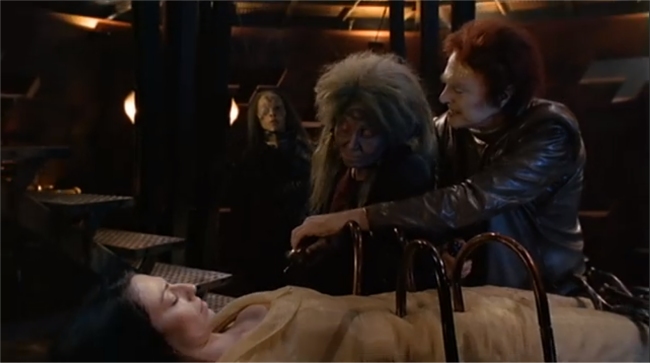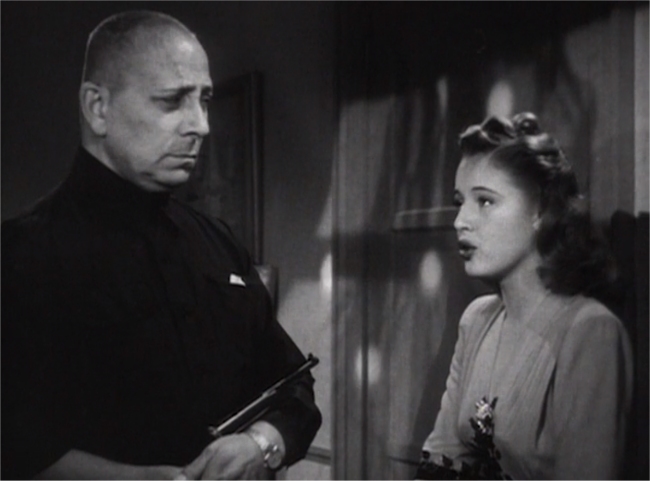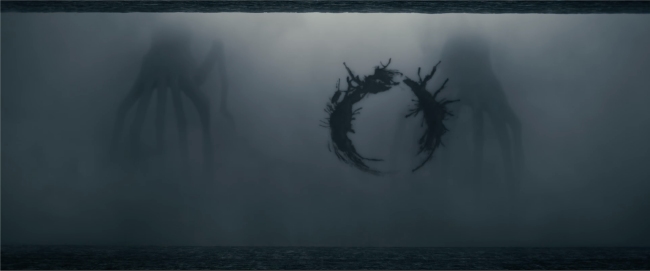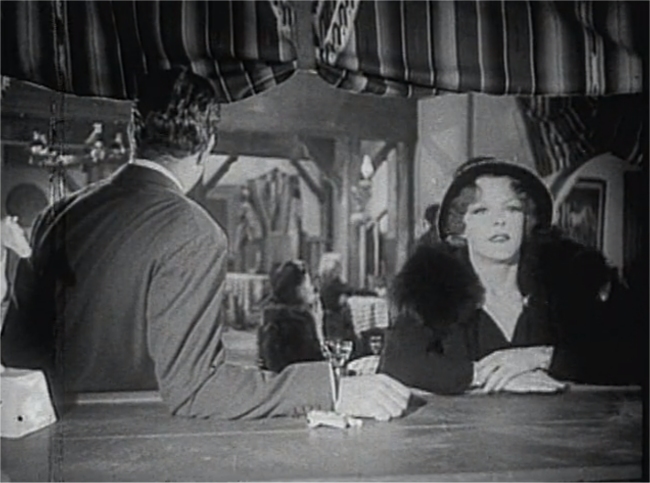
Last week, I posted the first part of my own Doctor Who fan fiction. So to-day I bring you the second, here you go:
DOCTOR WHO
"The New Model Tomb"
by Setsuled
Part II
A woman with torn and matted blonde hair pointed her pistol at the Doctor and demanded, “Well, where is it?! Ten thousand toktols now or you're dead!”
“Ten thousand toktols?” the Doctor blinked in surprise. “I haven't got ten thousand toktols. I don't even have one toktol. Have you any toktols, Rob?”
“Eh, what?” The air was chilly, like an early autumn evening in Plymouth, but he was sweating. His hand was on his sword but he didn't dare draw it. “Toktols—is that currency, then? I have a shilling and threepence.”
The woman with the gun snorted.
“This is probably all part of a slumber party for the E-Yuns,” bellowed a tall man with a large belly. “This may not be serious for you but when we Wuntas ask to be paid for services we expect to be paid.”
“Well, I'm afraid I don't usually carry money,” said the Doctor. “What services do you mean?”
A thin, red-headed young man of about twenty four or twenty five was looking at them with a more appraising eye than the others. “You know, I don't think this is the E-Yun you made the deal with, Brenda.”
“Yes, thank you,” said the Doctor. “We are simply travellers.”
“Travellers?!” Brenda scoffed, clearly unpersuaded, “Here?!”
“Want a tour of broken pipes and leaky roofs?” asked a thin, dark haired man coming down the metal stairwell of a nearby building.
“This place does look like it's seen better days,” said the Doctor, looking about. A third of the buildings on the narrow street looked as though they'd been in a terrible fire years ago and were never repaired. They were all tall buildings, each at least seven storeys and Rob marvelled that they could be so thin and sheer and not topple over. He wondered what could leave the gigantic black marks, visible beneath what must have been months or years of accumulated dust.
“Look,” the Doctor continued, “I haven't got any toktols but I am a doctor. Perhaps there's something I can do for you and in exchange perhaps you can tell me a bit about this place?”
“Doctor, eh?” said the tall man.
“Diana and the four girls from Henchal's could do with a doctor,” the red-headed man remarked in a low, cautious tone to the tall man.
“You think so, Billy?” said the tall man, peevishly amused. “And what would you know about doctors?” He turned to the Doctor. “You know what we did to the last doctor we saw down here?”
Rob half-expected some witty rejoinder from his new friend but he looked at her now to see a grave expression on her face. She said nothing, keeping her hands in the pockets of her velvet coat.
“My name's Rob Fenner,” he said suddenly. “I'm a seaman, I grew up in Plymouth, England, if that means anything to you. I haven't known the Doctor a long time but if she says she wants to help, I can testify, her word is good.”
“England?!” said the thin man. “They really are having a slumber party.”
“There's no harm in letting me at least look at this Diana and the four girls, is there?” the Doctor said, ignoring this last exchange.
“I have a better idea,” said Billy, the redhead. “What kind of ransom do you think these two would fetch, Tom?”
Suddenly, a great, swirling wind arose about them. Dust whirled about—Rob covered his face with his arm and through the sudden haze he could just make out the Doctor burying her face in her coat. White light like sunbeams appeared as glowing shafts in the dust. The Doctor grabbed Rob's sleeve and pulled him back to the edge of the road as a dark shape, the size of a sloop, descended and came to rest on the street with a hiss.
“Keep your hands in the air,” a woman's voice boomed from the object, impossibly loud. “I'm looking for Brenda Vitti.”
The people on the street all took cover or moved to the side of the street. The big man with the gut, Tom, looked at the thing with calm disgust. Brenda fidgeted in the doorway of a building behind him. No-one said anything. No-one raised their hands.
There was another hiss from the thing and a curved hatch opened up on one side. A plump, brown skinned young woman stepped out. She was pretty and about Rob's own age. She wore a simple one piece garment with numerous external pockets, each with a little flap. Over this was a peculiar suit of armour, more like a skeleton of armour than proper armour, a grid mesh involved with disjointed black webbing.
“I'm not here to hurt anyone,” she said, hers being the voice of the machine but now it was of a normal human volume. “I'm only here to speak with Brenda Vitti and I'm prepared to pay.”
“That's more like it,” said Brenda, stepping forward. Tom grunted out a derisively little laugh but didn't do anything to stop her.
The woman from the machine had a tense smile on her face and she looked around the buildings furtively. She really didn't look like she wanted to be there but she strode forward briskly, unfalteringly. So quick was her movement that Brenda recoiled a little.
“Don't be afraid,” said the woman. “I'm Detective Inspector Sara Marwat, we spoke yesterday on the comm link. May we go somewhere to speak alone?”
Rob had never seen anyone so easily master their own evident fear. The look in the inspector's eyes, which were a little moist with tears, was on the verge of panic but her gestures and her tone suggested only confidence and purpose.
“I got nothing to say these folk ain't fit to hear,” said Brenda. “And where are my toktols finally? What's the idea of sending your little scouts ahead empty handed?”
“Scouts?” said the inspector.
“Hello, I'm the Doctor,” said Rob's new friend pleasantly. “My companion here is Rob Fenner. Your name is Sara, I gather?”
Inspector Marwat looked at the Doctor and Rob in surprise but spoke to Brenda as though they weren't even there. With her eyes on the Doctor and Rob, she reached into a pocket on her left hip and produced several pink and white coins. “Here. Now what can you tell me about the night of February Fifth and Leland Shaw?”
Brenda smirked, putting the coins in a grubby purse hanging at her side. “He was at the party, all right. And Bobby Nelson and Eddie Yamaguchi were there, too, just like you said. Eddie tried that new beer from Harpsol and got sick in front of everyone. Leland and Bobby were playing darts.” She shrugged. “Pleasure doing business with you.”
“What was Eddie wearing?” the inspector persisted.
Brenda looked curiously at the woman. “I don't know. Shirt and trousers I guess. Don't remember the colour. The colour of puke by the end of the night I guess.”
The inspector considered this a moment then finally nodded. “Thank you for your cooperation, Miss Vitti. You may go.”
Brenda mockingly bowed before sauntering off. The others remained, watching the inspector.
“Well done!” said the Doctor, coming forward. “A keen nose has the local law enforcement, I see. It might interest you--”
“Who are you?” the inspector interrupted.
“As I said, I'm the Doctor and this is my companion, Rob. We're new here, travellers. I was wondering--”
“Travellers from where? Where was your point of entry on Mallos?”
“Mallos, ah! Of course.” The Doctor smiled and ran a hand through her hair as she looked about again at the buildings and at the twilight sky dotted with dark grey clouds.
“We came in that box yonder,” Rob said, pointing at the TARDIS. The inspector turned to look at the blue box and stared at it quietly. She still looked a little frightened and instinctively he wanted to reassure her. “The Doctor's right, I think, you're doing good work. A constable or magistrate of some kind, are you?”
At this the Doctor looked at Rob sharply, curiously, before turning to the inspector again. “You see, inspector, I understand there are five injured people nearby in need of medical assistance. Perhaps you can help me persuade these people to allow me to examine them?”
“Why?” asked the inspector.
“Er, like I said, I'm a doctor and I believe I might be of some help.” The Doctor licked her lips, waiting for the inspector to respond. “Maybe there's nothing I can do . . . but I won't know that until I see them, will I?”
“You're wasting your breath!” said Tom, laughing. “The good E-Yun Detective Inspector could care less for Diana and the girls!”
Detective Inspector Marwat regarded the Doctor with a look of abject terror. She looked ready to completely break down. The Doctor seemed at this point to finally notice it.
“Now, now, it's quite all right,” said the Doctor. “Er. Everything will be fine. You're doing a very good job and you'll be home, nice and safe, before you know it, I'm sure. I'm sure I can persuade Tom here to show me to his friends.”
“Yeah, all right, I suppose so,” Tom said grudgingly. “You don't seem like an E-Yun, anyhow.”
“It was very nice meeting you,” said the Doctor, starting to follow Tom. But Inspector Marwat also started to follow.
“I will accompany you,” she said, only a slight tremor in her voice as she stepped forward, pressing something on her wrist. Behind her, the hatch closed on her strange craft.
“That's the spirit!” said the Doctor. “Stay close to me and Rob and you'll be all right. Rob's a good stout lad, he'll see you come to no harm.”
Rob flushed red but added, “Yes, m'lady. Quite.” He offered his arm, wishing his sleeve wasn't so dirty. She looked at his elbow a moment, puzzled, and didn't take it. They all started together down the broken lane, Tom in the lead followed by the Doctor. Rob, walking beside the inspector, followed last.
“So . . .” he began, searching for a frame of reference. He'd never tried talking to one of the native girls at any of the ports in the West Indies. The last time he got anywhere with a woman was when he started talking to an English servant maid about living through the siege of Gloucester. “So . . . you're searching—doing a . . .” Words failed him. “What brings you here?”
She shot him a fearful look and then continued looking straight ahead but answered, “I'm investigating the poisoning of several Aeon citizens.”
“Aeon—oh, E-Yuns,” he realised lamely.
“Yes, that's what the Wanters call us,” she said softly, in almost a whisper. The Doctor had fallen back a bit, clearly having been listening to them the whole time.
“Wanters?” asked Rob. “Why do you call them that? What do they want?”
“How do you not know any of this?” she asked Rob.
“Rob is terribly out of touch,” the Doctor said apologetically. “Really, Rob, do pay attention.”
Rob laughed ruefully, “Right. I've been at sea too long, you might say.”
“The Wanters . . . want,” the inspector said helplessly. “That's how they live. Everything they do is because the want something. They want toktols or food or sex.”
“I see. Don't we all want some things now and then, though?” asked Rob.
The inspector blushed and dropped back, clearly wanting to disengage. Rob looked helplessly at the Doctor.
“By now, my boy, 'want' has come exclusively to mean desire, to covet,” the Doctor explained in a low voice.
“Oh,” said Rob, glancing back. “Is she a Puritan?”
“I very much doubt it . . .” she trailed off as she caught sight of something and smiled. “Hmm! Look at that.”
He followed her gaze and saw that the ubiquitous buildings had thinned out enough to allow a glimpse of grey hillside. On the hillside against the darkening sky was what looked like a Roman aqueduct except the top of it was glowing bright orange.
“'Zounds!” said Rob. “What on Earth is that?”
“Not on Earth, Rob,” she leaned in closer to him, her big eyes drawing him in. “We've come to the planet Mallos. And that, my boy, is part of a sophisticated system for harnessing geothermal power.”
“Geo—what?” he watched her breathlessly.
Her voice dipped dramatically, “Volcanoes. They use the power of volcanos to create automated light and heat—and many other wonders.”
“Incredible,” was all he could say, overcome fully now by the strangeness of how far he'd come. “And he people here--'tis all very like The Man in the Moon.”
“Read that, did you? You are full of surprises. We've come much further than the moon, though, and this world is much bigger. Tell me, Rob,” said the Doctor, now looking down at her feet, still clad in heeled slippers with ivory silk bows, as she picked her away over jagged, blackened plaster and masonry. “When you said the inspector had done a good job, what did you mean?”
“Well, like you said,” Rob glanced at the Doctor. “She's a canny inquisitor.”
“Yes, but why, exactly?”
“Well, she asked about some fellows named . . . Eddie and Leland . . . but what she really wanted to know was whether Brenda was in that party, I think. If Brenda had tried to act like she remembered what that fellow Eddie was wearing, or tried avoiding the question, the inspector would have concluded Brenda was lying,”
“Ah ha, yes! That's right,” the Doctor grinned, looking ahead. “Brenda was a suspect. And now, she knows Brenda has an alibi for February Fifth.”
“Ah . . .” said Rob slowly, glancing back at the taciturn inspector. “And so she's come with us now . . .”
“Because we likely look like prime suspects ourselves,” finished the Doctor.
TO BE CONTINUED





















































